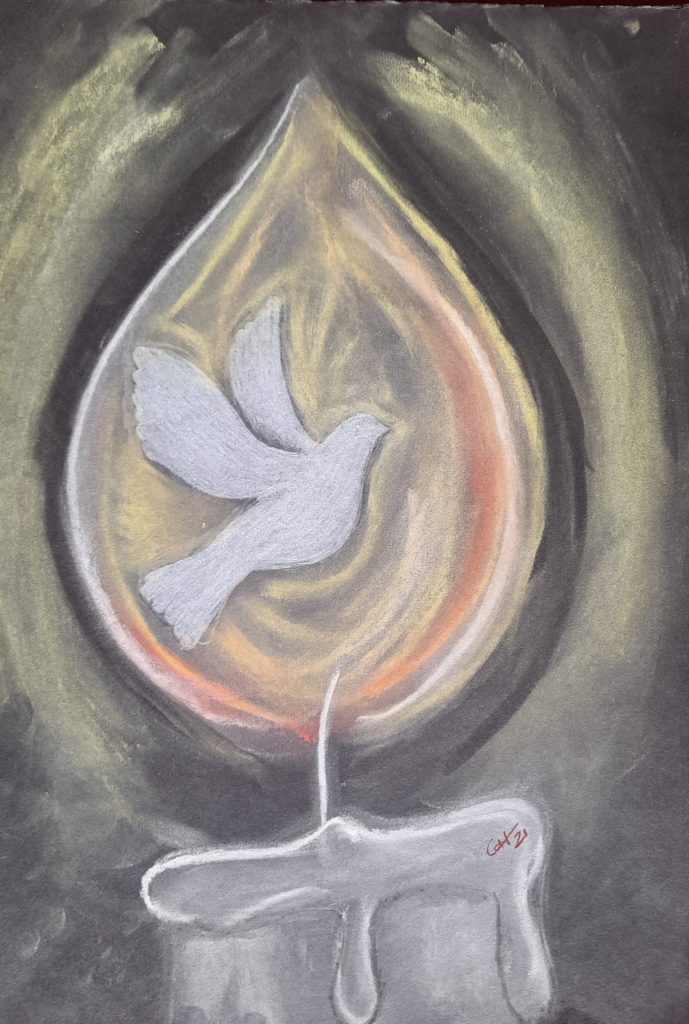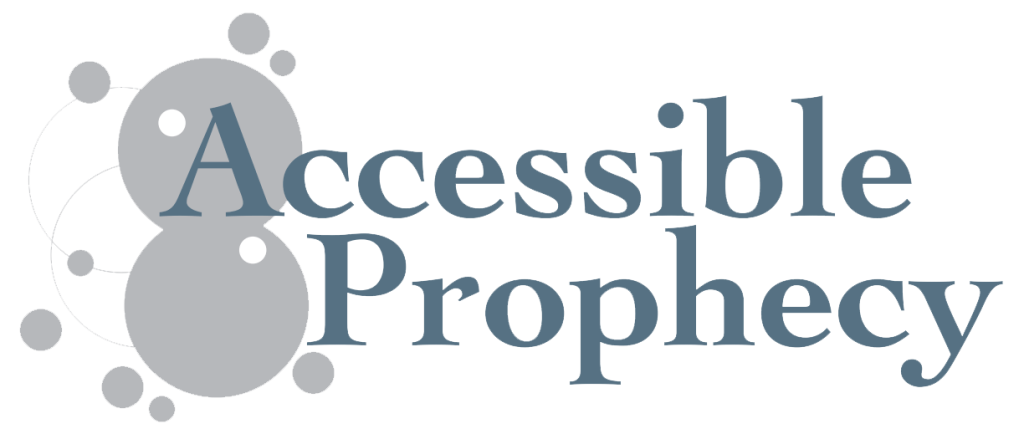We are delighted to have Karenza Mahtani write a series of Advent reflections for us over the next few weeks. Karenza is part of the Accessible Prophecy UK team. Art work is by Carolyn Higgins, another member of the team.
Over these Advent weeks, we will be following a similar pattern to the traditional Advent wreath – 5 candles, 5 opportunities to reflect on different parts of the story. What each of these candles represents tends to vary across theological and ecclesiastical traditions, but each representation offers a fresh moment to pause and connect with God. I encourage you to take these moments as we move through this season.
The true light that gives light to everyone, was coming into the world. He was in the world, and the world was created through him, and yet the world did not recognise him. He came to his own, and his own people did not receive him. But to all who did receive him, he gave them the right to be children of God, to those who believe in his name, who were born, not of natural descent, or of the will of the flesh, or of the will of man, but of God.
John 1:9-14

Last week, we reflected on the joy experienced by the shepherds and Simeon and Anna when they recognised that the promises of God had been fulfilled in sending Jesus. All of them experienced this joy, even though, as far as we know, only Simeon and Anna were waiting expectantly and specifically for the arrival of the Messiah. Nevertheless, all of them were in a position to receive the good news, the answer to the hopes and prayers of a yearning people across the centuries.
Are we in a position to recognize what God is doing in our lives and the lives of those around us? Are we attentive to what the Spirit is doing to bring answers to our prayers, breakthrough in our situations, and healing to our hearts? Sometimes we are quick to recognise it and to receive it with joy. Other times, it can be easy to miss what God is doing in our lives, especially if those lives are chaotic, stressful and noisy. Missing what God is doing can leave us going round in circles in our discipleship and prayer life. Moreover, if we aren’t aware of what God is doing in each of us, it can be difficult to express our testimony to others, as the shepherds and Anna did, especially to those who have not met Jesus yet. We know that knowing God closely makes an impact on us, but we also need fresh bread and new wine each day in order to grow closer to him and share the ongoing difference and transformation he brings to our lives. This starts with noticing when he is on the move.
In the Advent story, particularly in Luke 1, we see several figures who eagerly receive the news and play important roles in preparing the way for Jesus. Most notable amongst these is John the Baptist: he who “came as a witness to testify about the light, so that all might believe through him. He was not the light, but he came to testify about the light” (John 1 v 7 – 8). Just as the prophets of the Old Testament prophesied the Messiah’s coming, he is both a fulfilment of the prophecy of Isaiah 40—“a voice of one crying out in the wilderness: Prepare the way for the Lord; make his paths straight!”—but also someone who in turn prophesies about the imminent arrival of the Messiah.
In Luke 1, we see Zechariah and Elizabeth wrestling and receiving the response to their own prayers for children, despite their advanced years. Their differing responses are worth considering, as Zechariah initially appears sceptical about whether this is even possible. This leads to him becoming mute from then on, throughout the whole pregnancy, and only receiving his voice back when he is fully obedient to the instructions of the angel, going against custom and naming his son John. Perhaps this is a challenge for all of us – when we don’t recognise what God is doing, we can lose our voice to share with others. It is in our careful attention to his words and obedience to what he says, that enables us to speak with authority and for those around us to be blessed.
Elizabeth on the other hand, seems to receive this news with great thanksgiving: “The Lord has done this for me. He has looked with favour in these days to take away my disgrace among the people” (Luke 1 v 25). Later on in Luke 1, we see Gabriel also visiting Mary and delivering the news that she will bear the Son of God – this part is often the bit represented in school nativity plays. Yet it is the interaction between Mary and Elizabeth in Luke 1 verses 39 – 45 that shows us the real power of receiving and recognising what God is doing. Mary’s greeting is not only heard by Elizabeth, but by John in the womb who leaps and causes the Holy Spirit to fill Elizabeth – an overflow of God’s power and joy. This leads Elizabeth to declare: “Blessed is she who has believed that the Lord would fulfil what he has spoken to her.”
Indeed, this chapter finishes with a now fully restored Zechariah prophesying about both John and Jesus: “And you child, will be called a prophet of the Most High, for you will go before the Lord to prepare his ways, to give his people knowledge of salvation through the forgiveness of their sins. Because of our God’s merciful compassion, the dawn from on high will visit us to shine on those who live in darkness and the shadow of death, to guide our feet into the way of peace” (v 76 – 79). To those who receive this move of God, there is salvation, mercy, rescue for those who live in darkness and peace for those who are afflicted and oppressed.
As the nativity story progresses, it is interesting to notice who receives the news of Jesus’ birth with thanksgiving and joy – the shepherds, Mary and Joseph, Elizabeth and Zechariah, the wise men. Later on, as we read about Jesus’ life and ministry, it is the poor, the outcasts, the sick, the downtrodden, the sinners that receive him (and John the Baptist) with great joy. But not everyone does. Those who have already received their comfort and already have stations of power and privilege, such as King Herod and later on the Pharisees and other religious leaders, are threatened by his arrival. Those who know the promises and the prophecies, but seem to be hoping that they would not be realised, at least not during their day. Far from missing what God is doing, they perceive it as an open challenge to their own position. A cause of fear, not of hope. Something to be silenced and cut down. If you’ve read the rest of the Christmas story, and indeed the rest of the Gospels, you know what happens as they attempt to stifle what God is doing.
But what happens if we are not in one of those camps. We are not always like Elizabeth and Mary, receiving and recognising what God is doing quickly and experiencing the accompanying blessings. Nor (hopefully!) are we like Herod, wanting not only to ignore what God is doing because of fear, ignorance or an oppressive comfort, but also to stamp out what he is doing in others. What if we simply are too busy, too stressed, too preoccupied to notice the ways God is working in our lives. To some extent, I would expect that all of us have elements of this within our walks with God. Especially in this last lead up to Christmas, it can be easy to become overwhelmed with tasks and expectations and therefore all too easy to miss the still small voice of God and the subtle ways he is working all things for our good.
Today I would encourage you to just take some time to pause. Be at peace. Ask the Holy Spirit to show you places of joy and breakthrough. Ask him where he is moving in your life. Perhaps you could also ask him to show you or remind you of a testimony that you could share with someone who hasn’t heard that God is Immanuel – God with us. We are no longer alone. Consider the image, listen to the song or perhaps gather a playlist of your own and create some space. Hand your hopes and fears over to him and rest in the wonderful knowledge that all of them are met and answered in the person of Jesus.

